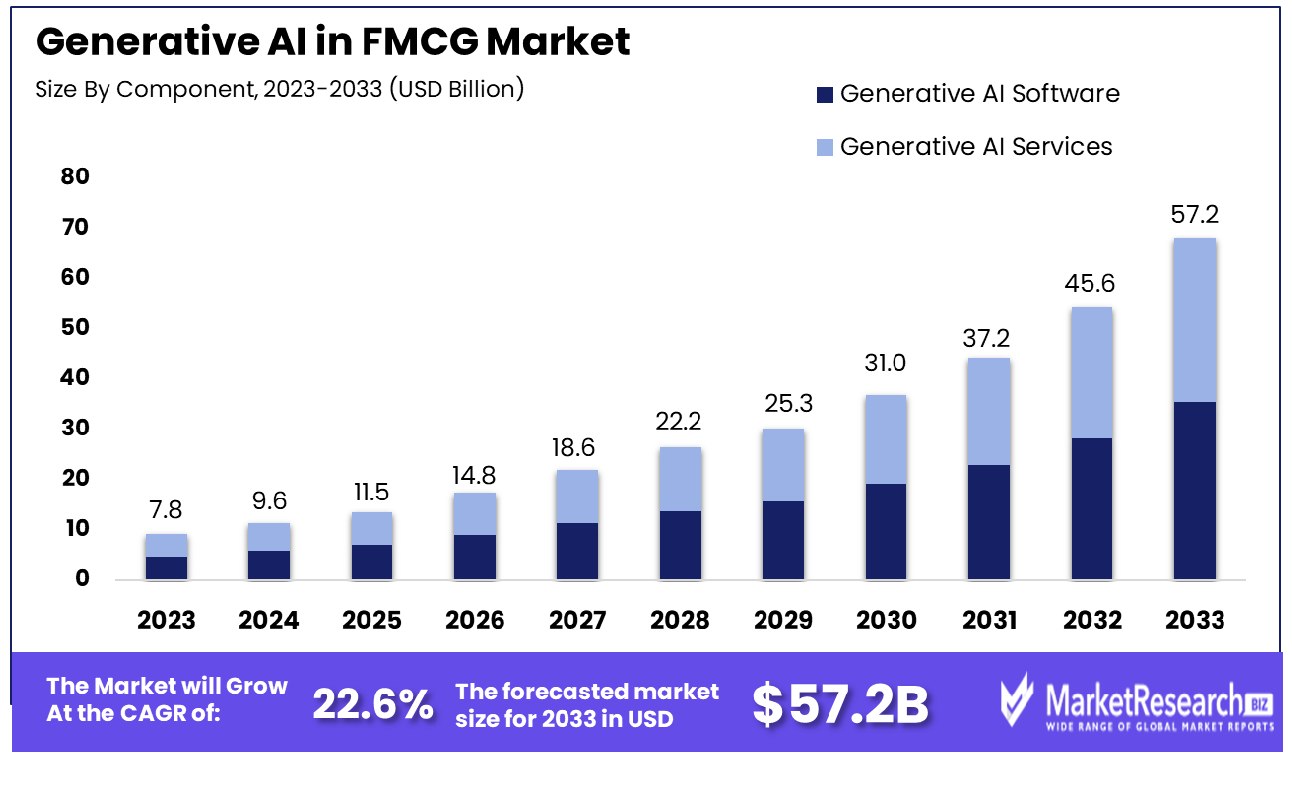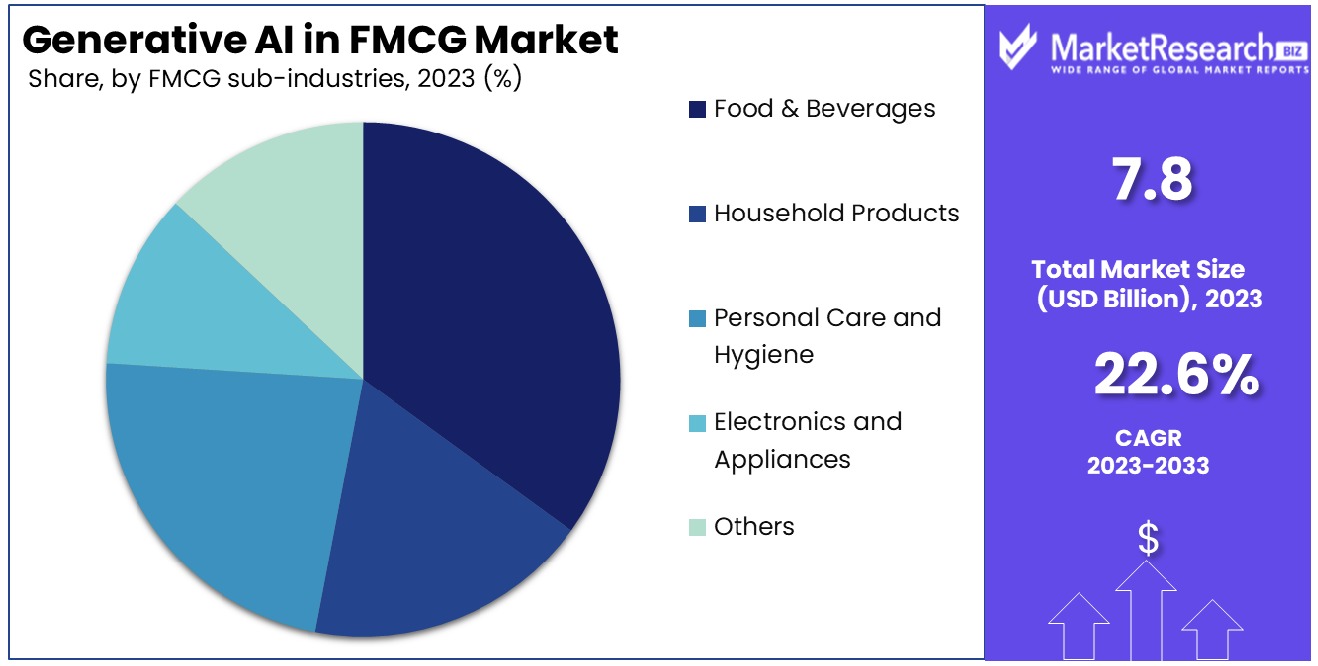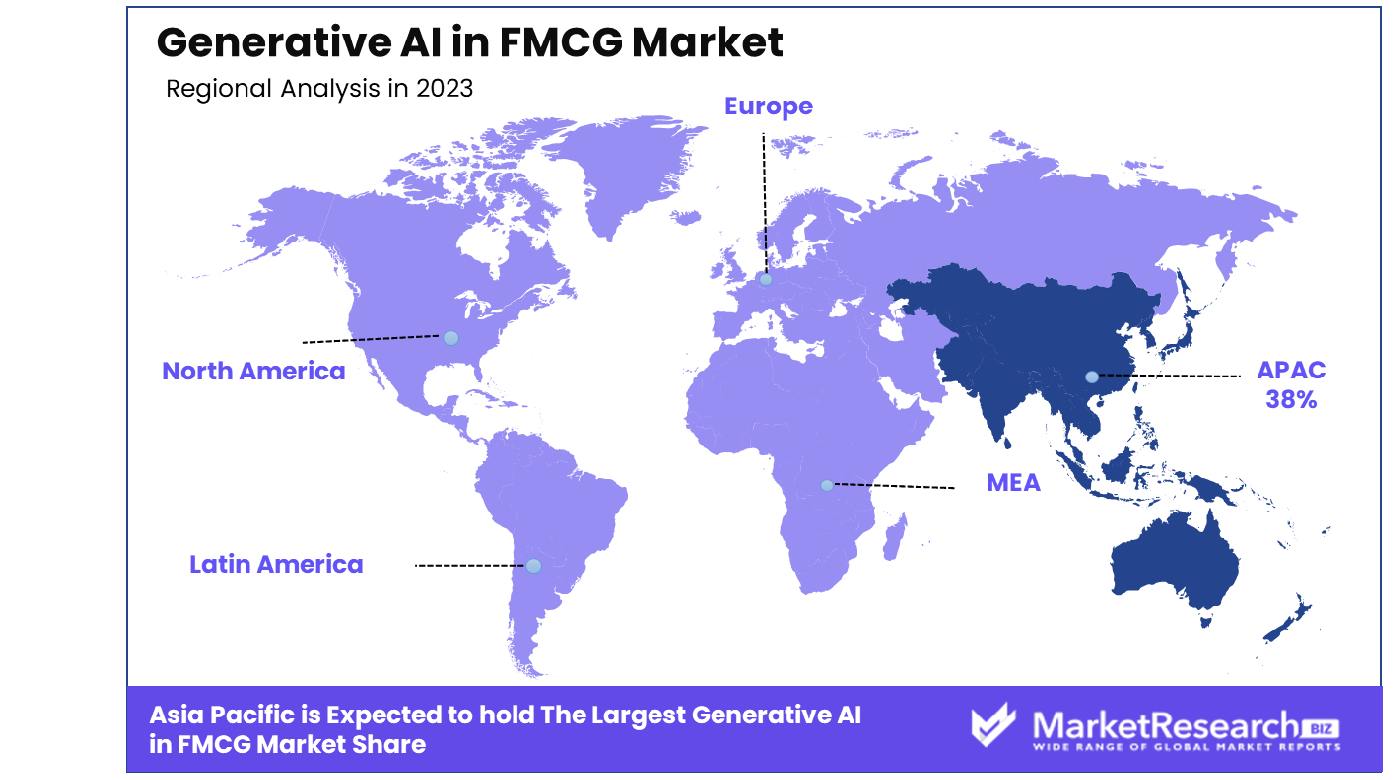
Generative AI in FMCG Market By Component(Generative AI Software, Generative AI Services), By Application(Demand Forecasting, Product Design and Innovation, Others), By FMCG sub-industries(Food & Beverages, Household Products, Personal Care and Hygiene Others), By Region And Companies - Industry Segment Outlook, Market Assessment, Competition Scenario, Trends, And Forecast 2024-2033
-
43236
-
Feb 2024
-
179
-
-
This report was compiled by Vishwa Gaul Vishwa is an experienced market research and consulting professional with over 8 years of expertise in the ICT industry, contributing to over 700 reports across telecommunications, software, hardware, and digital solutions. Correspondence Team Lead- ICT Linkedin | Detailed Market research Methodology Our methodology involves a mix of primary research, including interviews with leading mental health experts, and secondary research from reputable medical journals and databases. View Detailed Methodology Page
-
Quick Navigation
Report Overview
The Generative AI in FMCG Market was valued at USD 7.8 billion in 2023. It is expected to reach USD 57.2 Billion by 2033, with a CAGR of 22.6% during the forecast period from 2024 to 2033.
Generative AI in the Fast-Moving Consumer Goods (FMCG) Market refers to the integration of advanced artificial intelligence technologies that can generate new data, insights, and content within the FMCG sector. This innovation encompasses the creation of product designs, optimization of supply chains, enhancement of customer experience, and personalization of marketing strategies.

By leveraging algorithms that can learn from data patterns, Generative AI facilitates the rapid development and deployment of consumer products, ensuring companies stay competitive in a dynamically evolving marketplace. For executives and product managers, it represents a pivotal tool for driving efficiency, fostering innovation, and achieving a deeper understanding of consumer behavior, thereby significantly impacting market growth and operational excellence.
The integration of Generative AI within the Fast-Moving Consumer Goods (FMCG) industry is increasingly recognized as a transformative force amidst the sector's ongoing adaptation to both global challenges and opportunities. The year 2022 and beyond saw the FMCG landscape grappling with unprecedented supply chain disruptions, a scenario further complicated by the significant shifts in consumer behavior and demand patterns.
Notably, a report by KPMG underscored the acute pressure exerted on global companies, with 71% citing the surge in raw material costs as the paramount supply chain threat for 2023. This backdrop of operational and economic hurdles highlights the critical role of Generative AI in offering resilient and innovative solutions.
Generative AI stands at the forefront of addressing these challenges by enabling FMCG companies to revolutionize product development, optimize supply chain efficiencies, and tailor consumer experiences with unprecedented precision. Its capability to generate predictive models and simulate outcomes allows for strategic decision-making that mitigates risks associated with raw material scarcities and logistical constraints. Furthermore, by harnessing the power of Generative AI, firms can rapidly innovate and customize products in alignment with evolving consumer preferences, thus securing a competitive edge in a volatile market.
The strategic incorporation of Generative AI technologies within the FMCG sector is not merely an option but a necessity to navigate the complexities of today's global market dynamics. It promises not only to enhance operational agility but also to foster sustainability and growth in an industry facing constant pressure to evolve. As such, the adoption of Generative AI is pivotal for FMCG companies aiming to thrive amidst the challenges of cost pressures and supply chain volatility, ensuring they remain at the vanguard of innovation and market responsiveness.
Key Takeaways
- Market Growth: Generative AI in FMCG Market was valued at USD 7.8 billion in 2023. It is expected to reach USD 57.2 Billion by 2033, with a CAGR of 22.6% during the forecast period from 2024 to 2033.
- By Component: Generative AI Software holds a commanding position in the FMCG market, with a dominant 70% market share.
- By Application: Demand Forecasting emerges as a leading segment, capturing a 15% share.
- By FMCG Sub-industries: Food & Beverages is the dominant sub-industry in the Generative AI in the FMCG market, with a 30% share.
- Regional Dominance: Asia-Pacific Dominates with 38% Market Share in Generative AI for FMCG Market
- Growth Opportunity: Generative AI in FMCG heralds growth opportunities in predictive analytics for demand forecasting and sustainable manufacturing, driving efficiency and environmental stewardship.
Driving factors
Innovative Product Development Accelerates FMCG Market Growth
The FMCG sector is witnessing a surge in innovation and product development, thanks to generative AI. These technologies are revolutionizing how new products are conceived, offering a plethora of ideas and prototypes with accelerated innovation cycles. Colgate-Palmolive's pilot of a generative AI-enabled chatbot exemplifies this trend, blending data curation with content creation to inform product development. This approach is reshaping the FMCG landscape, enabling companies to rapidly adapt to market trends and consumer preferences, thereby driving market expansion.
Demand Forecasting Precision Propels Market Efficiency
Generative AI's impact on demand forecasting and inventory management in the FMCG market is profound. The U.S. Census Bureau's November 2023 data reflects a noticeable uptick in manufactured goods orders, underscoring the importance of precise demand forecasting. By harnessing AI to analyze extensive sales and market data, firms like PepsiCo achieve heightened demand sensing, resulting in optimized inventory management and reduced waste. This precision in forecasting equips FMCG business companies with the agility to align supply with fluctuating market demands, enhancing overall market growth.
Hyper personalized Marketing Enriches Customer Engagement
Generative AI's ability to tailor marketing efforts down to microsegments or individual preferences is transforming FMCG marketing strategies. Coca-Cola's partnership with OpenAI's generative AI technology for marketing initiatives demonstrates the potential for creating deeply personalized consumer experiences. This level of customization in advertising and promotions not only elevates brand engagement but also drives significant market growth by resonating more effectively with diverse consumer segments.
AI-Driven Agile Supply Chains Enhance Market Responsiveness
The integration of generative AI in supply chain management significantly contributes to the FMCG market's agility and resilience. The potential benefits, exceeding 35% efficiency gains for optimized supply chains, highlight the transformative impact of AI in modeling and adapting to supply chain disruptions. Companies like Unilever are leveraging AI to analyze patterns and optimize logistics operations, enabling real-time responsiveness to market changes and ensuring uninterrupted supply flows.
Restraining Factors
Data Constraints Impede Generative AI Integration in FMCG Sector
In the Fast-Moving Consumer Goods (FMCG) sector, the success of generative AI largely hinges on the availability and quality of data. These AI models necessitate extensive, well-structured data sets for effective training. A significant barrier arises when sufficient and relevant data are absent, particularly for smaller FMCG firms that may not have extensive customer data repositories. This lack of robust data can severely limit the ability of generative AI models to produce accurate and useful outputs, thereby hindering the development and application of these technologies in the FMCG market.
Cost Implications Restrict Generative AI Adoption by Smaller FMCG Firms
The development of bespoke, high-quality generative AI models for the FMCG industry demands substantial investment, not only in terms of financial resources but also in acquiring specialized talent and computational infrastructure. Smaller FMCG firms, in particular, face a significant challenge in this regard, as the return on investment (ROI) from such heavy expenditures remains uncertain. This financial barrier, coupled with the need for substantial upfront costs, acts as a deterrent for many smaller players in the FMCG market, limiting the widespread adoption and implementation of generative AI in this sector.
By Component Analysis
Generative AI Software holds a commanding position in the FMCG market, with a dominant 70% market share.
This segment's preeminence is primarily due to the software's ability to generate novel data points and insights, driving innovation and efficiency in the FMCG business sector. The software applications range from optimizing production processes to enhancing customer engagement strategies. The versatility of generative AI software, capable of being integrated into various stages of the product lifecycle, from development to marketing, marks its dominance.
Generative AI Services, while crucial, support the software segment by offering specialized expertise in implementation, customization, and ongoing support. These customer services ensure that businesses can effectively leverage generative AI capabilities. However, the core functionalities and transformative impact provided by the software itself remain the primary driver of this segment's market leadership.
By Application Analysis
In applications, Demand Forecasting emerges as a leading segment, capturing a 15% share.
In the dynamic FMCG market, accurate demand forecasting is crucial for minimizing inventory costs and maximizing sales. Generative AI excels in analyzing complex, multifaceted market data to predict consumer demand patterns, making it an invaluable tool for FMCG companies. This application of AI aids in optimizing stock levels, reducing waste, and ensuring product availability.
Other applications like Product Design and Innovation, Personalized Marketing, Price Optimization, Supply Chain Optimization, Consumer Insights, Content Generation, Quality Control, Packaging Design, and Promotion Planning are also significant. Each of these applications leverages generative AI to enhance various aspects of FMCG operations. However, the critical role of Demand Forecasting in maintaining operational efficiency and competitiveness underscores its dominance in this market segment.
By FMCG Sub-industries Analysis
Food & Beverages is the dominant sub-industry in the Generative AI in the FMCG market, with a 30% share.
The food and beverage sector is particularly suited to benefit from generative AI through applications in product development, demand forecasting, and consumer preference analysis. In this sector, generative AI helps in creating new product formulations, understanding evolving consumer tastes, and managing supply chain complexities.
Household Products, Personal Care and Hygiene, Electronics and Appliances, and other sub-industries also significantly utilize generative AI. In Personal Care and Hygiene, AI is used for product customization and trend analysis, while in Electronics and Appliances, it assists in predictive maintenance and innovation. Despite this, the sheer scale, consumer engagement, and rapid innovation cycles in the Food & Beverages sector highlight its preeminence in leveraging generative AI technologies.

Key Market Segments
By Component
- Generative AI Software
- Generative AI Services
By Application
- Demand Forecasting
- Product Design and Innovation
- Personalized Marketing
- Price Optimization
- Supply Chain Optimization
- Consumer Insights
- Content Generation
- Quality Control
- Packaging Design
- Promotion Planning
- Others
By FMCG sub-industries
- Food & Beverages
- Household Products
- Personal Care and Hygiene
- Electronics and Appliances
- Others
Growth Opportunity
Predictive Analytics Transformative Potential for the FMCG Sector
Expansion Role In the fast-moving consumer goods (FMCG) sector, predictive analytics powered by generative AI emerges as a transformative factor. FMCG companies, often challenged by demand forecasting and supply chain optimization, find respite in AI's ability to process vast data sets for accurate predictions and efficient inventory management.
Notable is the collaboration between Unilever and Accenture at Unilever's "Horizon3 Labs" in Toronto, a hub for AI innovation. This partnership exemplifies how integrating AI into FMCG operations can significantly enhance productivity, streamline efficiencies, and foster AI-driven innovations, marking a significant shift towards data-driven decision-making in the industry.
Sustainable Manufacturing A Green Revolution Through Generative AI
Expansion Role Sustainable manufacturing in the FMCG industry is receiving a significant boost from generative AI. The technology's potential to streamline production processes to minimize waste and reduce energy consumption directly aligns with the industry's sustainability objectives.
This innovative approach tackles the critical issue of environmental impact, offering FMCG companies a pathway to not only enhance their operational efficiency but also to solidify their commitment to environmental stewardship. The incorporation of AI into manufacturing processes signifies a pivotal shift towards more responsible production methods, thereby offering substantial growth opportunities for companies prioritizing sustainability in their business models.
Latest Trends
Hyper-Personalization of Consumer Products
One of the most significant trends is the use of Generative AI to create hyper-personalized products and marketing strategies. By analyzing vast datasets on consumer behavior, preferences, and purchasing patterns, AI algorithms can now generate unique product formulations, packaging designs, and targeted marketing campaigns. This trend is revolutionizing the way FMCG companies interact with their customers, offering personalized experiences at an unprecedented scale, thereby enhancing customer loyalty and satisfaction.
Sustainable Supply Chain Optimization
Another emerging trend is the application of Generative AI in optimizing supply chain operations for sustainability. As environmental concerns become increasingly paramount, FMCG companies are leveraging AI to improve the efficiency of their supply chains, reduce waste, and minimize carbon footprints. By predicting demand more accurately, optimizing routes, and simulating the environmental impact of various supply chain decisions, Generative AI is enabling companies to make more sustainable choices without compromising on efficiency or profitability.
Regional Analysis
Asia-Pacific Dominates with 38% Market Share in Generative AI for FMCG Market
Asia-Pacific's significant 38% stake in the Generative AI in FMCG Market is underpinned by its burgeoning technological advancements and rapid digitalization across numerous industries. The region, especially countries like China, Japan, and South Korea, is witnessing an accelerated adoption of AI technologies in the FMCG sector. This surge is largely driven by the growing necessity for enhanced predictive analytics in supply chain optimization, demand forecasting, and personalized customer experiences. Furthermore, the region's extensive manufacturing capabilities, coupled with its large consumer base, are pivotal factors propelling the application of Generative AI in this sector.
The dynamism in the Asia-Pacific market is characterized by a blend of advanced technology adoption and a deep-rooted FMCG sector. The region's inclination towards innovation and adapting to AI-driven solutions has enabled companies to optimize operations and enhance customer engagement strategies. Additionally, the integration of AI in FMCG is bolstered by governmental support for tech-driven initiatives and a collaborative ecosystem involving tech giants and startups. This synergy is creating a fertile ground for AI applications, thus fueling market growth.

North America's Strategic Position in Generative AI for FMCG Market
In North America, the Generative AI in the FMCG market is experiencing robust growth, with the region leveraging its advanced tech infrastructure and a strong focus on R&D. Companies are increasingly using AI for market trend analysis, consumer behavior prediction, and optimizing logistics. The region's strong emphasis on data-driven decision-making and a culture of technological innovation are key drivers of this market.
Europe's Progressive Role in Generative AI for the FMCG Market
Europe's market share in Generative AI for FMCG is characterized by its stringent data protection laws and focus on sustainable practices. European FMCG companies are integrating AI to achieve efficiency, particularly in supply chain management and sustainable manufacturing. The region's commitment to ethical AI and sustainability aligns with evolving consumer preferences, thus shaping its market growth.
Key Regions and Countries
North America
- The US
- Canada
- Rest of North America
Europe
- Germany
- France
- The UK
- Spain
- Netherlands
- Russia
- Italy
- Rest of Europe
Asia-Pacific
- China
- Japan
- Singapore
- Thailand
- South Korea
- Vietnam
- India
- New Zealand
- Rest of Asia Pacific
Latin America
- Mexico
- Brazil
- Rest of Latin America
Middle East & Africa
- Saudi Arabia
- South Africa
- UAE
- Rest of Middle East & Africa
Key Players Analysis
In the Fast-Moving Consumer Goods (FMCG) sector, generative AI is revolutionizing market strategies, operational efficiencies, and consumer engagement. The landscape is dominated by technology giants and consulting firms that provide AI solutions tailored to the dynamic needs of FMCG brands.
IBM leverages its Watson platform to offer insights into consumer behavior, supply chain optimizations, and predictive analytics, enabling FMCG companies to forecast demand more accurately and tailor their marketing strategies effectively.
Microsoft, through Azure AI, empowers FMCG companies with advanced analytics, machine learning, and cognitive services, facilitating enhanced customer experiences and streamlined operations.
Google Cloud offers cutting-edge AI and machine learning capabilities that FMCG companies utilize for everything from optimizing logistics to personalizing customer interactions, thereby improving efficiency and driving growth.
Amazon Web Services (AWS) provides a wide array of AI services that assist FMCG brands in harnessing the power of data for better decision-making, from product development to customer satisfaction and retention strategies.
Market Key Players
- IBM
- Microsoft
- Google Cloud
- Amazon Web Services (AWS)
- SAP
- Oracle
- Accenture
- Capgemini
- SAS
- Alibaba Cloud
- Other key players
Recent Development
- In December 2023, The Dubai Department of Economy and Tourism (DET) partnered with Procter & Gamble (P&G) to enhance Dubai's FMCG sector, focusing on SME growth, talent training, sustainability, and embracing a circular economy.
- In December 2023, Tata Consumer Products expanded its innovative product range, achieving a 5% innovation-to-sales ratio in Q2 FY24, including health-focused items like Apple Cider Vinegar and Simply Better Cold Pressed Oils.
- In December 2023, IPM India focused on upskilling its teams for 2024, emphasizing adaptability, innovation, supply chain management, and customer-centric skills to enhance employee efficiency and productivity in the competitive FMCG industry.
Report Scope
Report Features Description Market Value (2023) USD 7.8 Billion Forecast Revenue (2033) USD 57.2 Billion CAGR (2024-2032) 22.6% Base Year for Estimation 2023 Historic Period 2016-2023 Forecast Period 2024-2033 Report Coverage Revenue Forecast, Market Dynamics, COVID-19 Impact, Competitive Landscape, Recent Developments Segments Covered By Component(Generative AI Software, Generative AI Services), By Application(Demand Forecasting, Product Design and Innovation, Personalized Marketing, Price Optimization, Supply Chain Optimization, Consumer Insights, Content Generation, Quality Control, Packaging Design, Promotion Planning, Others), By FMCG sub-industries(Food & Beverages, Household Products, Personal Care and Hygiene, Electronics and Appliances, Others) Regional Analysis North America - The US, Canada, Rest of North America, Europe - Germany, France, The UK, Spain, Italy, Russia, Netherlands, Rest of Europe, Asia-Pacific - China, Japan, South Korea, India, New Zealand, Singapore, Thailand, Vietnam, Rest of Asia Pacific, Latin America - Brazil, Mexico, Rest of Latin America, Middle East & Africa - South Africa, Saudi Arabia, UAE, Rest of Middle East & Africa Competitive Landscape IBM, Microsoft, Google Cloud, Amazon Web Services (AWS), SAP, Oracle, Accenture, Capgemini, SAS, and other key players Customization Scope Customization for segments, region/country-level will be provided. Moreover, additional customization can be done based on the requirements. Purchase Options We have three licenses to opt for Single User License, Multi-User License (Up to 5 Users), Corporate Use License (Unlimited User and Printable PDF) -
-
- IBM
- Microsoft
- Google Cloud
- Amazon Web Services (AWS)
- SAP
- Oracle
- Accenture
- Capgemini
- SAS
- Alibaba Cloud
- Other key players




